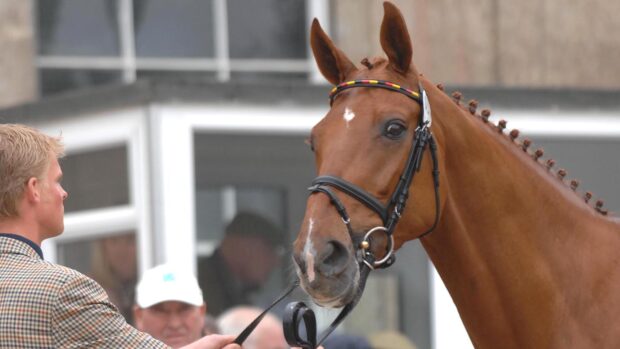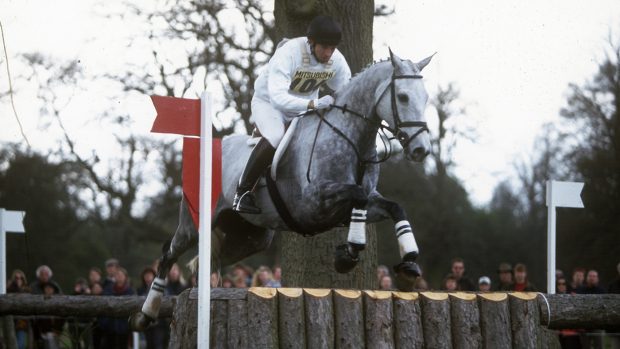A young rider whose chronic illness diagnosis empowered her to fight harder to achieve her dreams says if her experiences inspires one other person, “that’s what it’s all about”.
Georgia Gardner has recently been diagnosed with Ehlers Danlos syndrome, a connective tissue disorder that causes hypermobility, which explained some of the symptoms she had been experiencing since childhood. It came three to four years after a diagnosis of endometriosis, an incurable condition in which tissue similar to the womb lining grows elsewhere and can cause extreme pain.
“My body is not like other people’s bodies; I have to work 10 times harder to achieve the same results,” Georgia told H&H. “This empowered me to keep working, keep fighting and most importantly to share my journey with other riders, young and old, and who may be a little bit different, to keep going.”
Georgia, who is now 22, has loved horses for as long as she can remember.
“I was the kid who, every Christmas and birthday, asked for a pony but Mum and Dad couldn’t afford it,” she said. “I started riding as soon as could as that was all I wanted to do. Lots of friends had ponies so I rode with them, and I went to a riding school, and used to look after horses in exchange for rides, and ended up getting a loan cob.
“But about the time I left the riding school, I started getting pain all over my body. I always had problems with my hips, and back pain, and various knee problems. About six months ago, I had an appointment with the pain clinic and they said ‘You shouldn’t be able to lock your hands behind your back like that’ and do all the weird bendy stuff I do, but I thought that was normal.
“I thought everyone hurt for an extended time when they fell off, I thought it was normal. I never thought to say anything as that was all I knew.”
About eight years ago, Georgia bought her first horse. Part-thoroughbred 16.3hh Junior, then 12, was “completely not what I was looking for”, but Georgia felt a connection with him and took him home.
Their partnership was challenging, she added.
“It took me about four years to be able to ride him properly,” she said. “He would nap and rear, and threw himself backwards on the concrete. I don’t know what had happened to him but I don’t think he’d had the best start; his feet were overgrown and he was dull, and all he’d known was work.”
Stumped after many falls, and having treated issues including ulcers, Georgia tried a different approach.
“You feel hopeless when you’re young and trying to make money stretch and do the best by your horse, and you’re both hurting,” she said. “So you try to find ways to bond that don’t involve riding. So I gave him time off, then stripped it back to basics.”
This involved taking off the pelham and martingale recommended by the yard she was at, and re-backing Junior.

“It was about trying to fill in the gaps in his brain and get over the pain memory,” she said. “You remember something hurts and don’t want to do it again; I do that too so it helped me to help him.”
Georgia rode bareback, then without a bridle, then without both. She taught Junior tricks, and kept the work interesting, which she said not only helped the horse but benefited her too, as it took her mind off her health.
“People looked at me like the weird kid but I got to the point where as long as we were happy, I didn’t care what other people thought,” she said. “You feel like people are looking at you but I was just trying to make it work, and it did.”
It worked to the point Junior is still fit and happy and competing, aged 20.
“I was going to retire him this year but he wasn’t having it!” Georgia said. “And as long as he wants to keep going, we’ll keep going. He knows what he’s doing and wants to do it, which means another season competing with my best friend.”
Georgia started an Instagram account to share pictures of Junior, and she now has thousands of followers, and has sponsorship from Freejump and Stasis Equine Therapies.
“My Instagram is a place for disabled riders like me to feel welcomed, to never be put aside and ignored,” she said. “My biggest goal in life is to inspire at least one person to keep on going with their riding journey when they feel like giving up.
“I may not be a top showjumper or eventer, but I plan to keep working on getting myself up the levels in showjumping and eventing, I may not ever get to the top. But I take pride in knowing that although I have this disability, I still keep going through the pain to do the sport I love.”
She is hopeful that she will soon have an operation for her endometriosis – “they think some of the tissue is attached to a nerve in my spine so some days I can’t put my right leg to the floor,” she said, adding that although some days she is comfortable, on others she has to stay in bed and just breathing is painful.
But she is also planning her 2023, aiming to compete in showing and jumping with Junior, and to look for another horse in the spring.
“But no matter the competition results, I will continue to share my journey to help others,” she said.
Georgia added that she knows how isolating it can feel to have a significant health issue or disability, and she hopes to help in that sense. She said companies and equestrian businesses are thinking much more about accessibility, but she would like to see changes to the para equestrian grading system that would mean people with disabilities such as hers are eligible. She would also like to see more awareness of measures that could be taken to improve competition for riders with disabilities or health issues.
“Making it easier to warm up or course-walk, for example,” she said. “There are days I can’t course-walk, there are days I sit in the lorry for an hour afterwards because I can’t feel my legs. It’s all for that two minutes in the ring but it’s worth it. It’s going to the yard, having fun, seeing your friends and cheering each other on – and if you fall off, you just hope someone’s got a photo! It makes all the pain worth it.
“I’ve had a patchy year; sometimes I’ve had eliminations but others, I’ve been placed, and beaten other people, who don’t see the days I have to use mobility aids or the other side of things. I’m just another person on a horse. And if I can help one person to think ‘I’ll keep trying to compete’ or ‘I’ll enter that class’ or ‘I’ll ride today’, that’s all that matters.”
You might also be interested in:

‘I’d rather ride than have a longer life without horses’: inspirational young rider will not let illness control her life
‘If something does happen, I know I’ve had a fulfilling life; that’s all anyone can ask for’

Young rider’s para jumping campaign is ‘breathtaking’ *H&H Plus*

Subscribe to Horse & Hound magazine today – and enjoy unlimited website access all year round
Horse & Hound magazine, out every Thursday, is packed with all the latest news and reports, as well as interviews, specials, nostalgia, vet and training advice. Find how you can enjoy the magazine delivered to your door every week, plus options to upgrade your subscription to access our online service that brings you breaking news and reports as well as other benefits.





